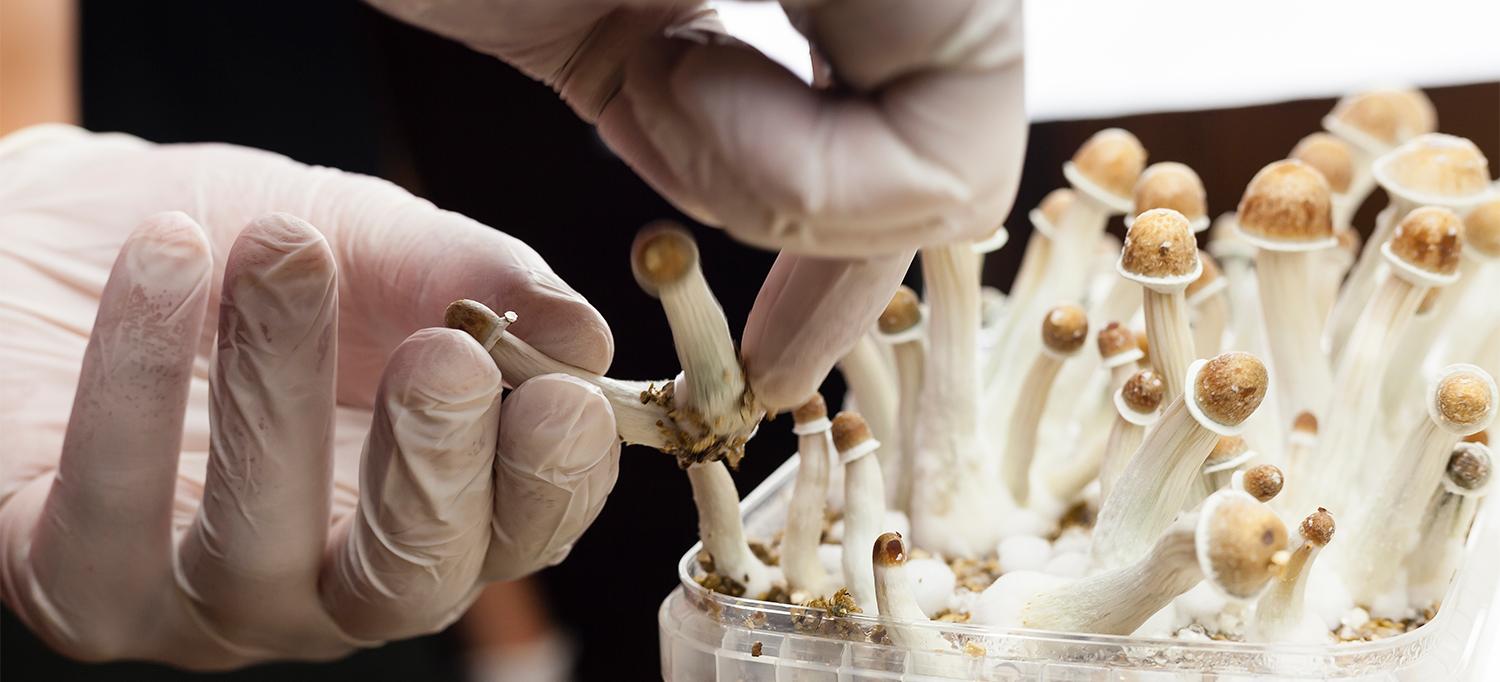Massachusetts supports psilocybin research in 2025 through federally regulated pathways that allow qualified teams to study the compound in clinical and preclinical settings. Investigators operate under FDA oversight, DEA Schedule I controls, and IRB approval, which together make research lawful at hospitals and universities across the state. Sites in Boston and Worcester run trials with trained staff, secure storage, and documented procedures that match federal expectations.
Current legal context for psilocybin research in Massachusetts
Psilocybin remains a Schedule I controlled substance at the federal level. That status restricts general access, yet it permits research when institutions meet federal and institutional rules. Massachusetts follows the same national framework used in other states. Local research teams secure IRB approval, operate under FDA regulations for human subjects, and hold DEA registrations for storage and handling at each site.
Massachusetts does not have a state level medical psilocybin program that overrides federal law. Research moves through the same path that governs other Schedule I studies. Hospitals and universities set policies that reflect federal controls and add local guardrails for security and pharmacy practice. This alignment allows investigators to run Phase 1 through Phase 3 studies in depression, oncology related distress, addiction, and mechanistic neuroscience while keeping records ready for audit.
The state’s dense life sciences cluster helps. Academic medical centers share staff who know controlled deliveries, chain of custody, and temperature monitoring. CROs and analytics labs in the region support validated methods for identity, assay, impurities, and microbiology. These assets allow Massachusetts sites to launch studies on realistic timelines and maintain quality during enrollment.
Federal scheduling and how MA institutions work within it
Schedule I registration sits at the center of operational planning. A Massachusetts site that will receive, store, or dispense psilocybin needs a DEA Schedule I researcher registration at the exact address. If product will be imported, the site also applies for a DEA import permit that lists substance, quantity, supplier, and route. Permit dates must match shipping windows to avoid holds at customs or the receiving dock.
FDA oversight guides clinical design. Many investigator initiated studies in Massachusetts run under an IND. The IND includes chemistry and manufacturing information, nonclinical data that support first use in humans or dose selection, and the clinical protocol with endpoints, monitoring, and analysis plans. The IRB package mirrors these details and adds consent materials, support model descriptions, and data safety procedures.
Hospitals and universities then implement site level controls. Storage rooms are locked with restricted access lists. Pharmacy SOPs cover receipt, preparation, dispensing, reconciliation, and destruction. Staff complete role specific training and sign access logs. Chain of custody records document each handoff from shipment to storage to dispense to destruction. Temperature logs run from the shipper to the pharmacy fridge or safe and continue through in use periods.
These steps may look strict, yet they keep trials steady. When an auditor visits or a monitor reviews files, a clean trail of permits, shipment memos, COAs, kit lists, receipt logs, and accountability records reduces questions. That stability lowers the risk of study holds and missed visits.
State universities and hospitals leading in research
Massachusetts institutions contribute across depression, oncology related distress, addiction, and mechanistic work that uses imaging and cognitive tasks. Several centers stand out for infrastructure and experience.
Boston academic hospitals
Massachusetts General Hospital runs a program focused on the neuroscience of psychedelics. Teams study rumination in depression, neuroplasticity markers, and patient reported outcomes tied to session support models. Imaging units schedule fMRI tasks that align with dose timing and symptom assessments. Pharmacy services handle blinded capsule or tablet kits with matched placebo and maintain reconciliations for dosing and returns.
Dana-Farber Cancer Institute has led work in cancer care where depression and distress are common. Studies pair psilocybin sessions with structured therapy in group or individual settings. Oncology centers bring a strong culture of safety checks, room readiness, and observation windows, which fits the demands of psychedelic dosing days.
Teaching hospitals across Boston contribute therapists, raters, and pharmacists who are familiar with complex trial logistics. Their experience with oncology and infectious disease trials translates to controlled deliveries, double checks on kits, and quick deviation handling. That culture helps session based research keep to tight calendars.
Worcester research programs
The University of Massachusetts Chan Medical School participates in multicenter trials in depression and related mood conditions. Site teams include psychiatrists, research pharmacists, and coordinators trained on blinded dose prep, session scheduling, and data capture. Worcester based programs benefit from a campus setting with centralized IRB, pharmacy oversight, and secure research storage tailored to controlled substances.
Worcester hospitals that support research handle deliveries through central receiving, then move shipments under escort to locked pharmacies. Accountability software logs kit IDs against subjects and visits, which shortens reconciliation at closeout. This approach protects session timing while keeping records inspection ready.
Cross campus collaboration
Boston and Worcester programs often share staff training, therapist supervision models, and imaging protocols. Shared intake checklists and binder maps give new sites a head start on IRB submission and pharmacy readiness. Regional CROs help align outcome measures, visit schedules, and eCRF designs so data sets can be compared or pooled when appropriate.
What compliance looks like for labs in Boston and Worcester
Compliance runs on habits, not only documents. Labs and pharmacies in Massachusetts follow practical routines that keep daily work aligned with the file.
Receipt and intake
Teams schedule controlled deliveries during staffed hours. The consignee confirms permit dates and consignee names match airway bills. On arrival, staff inspect seals, verify labels, and log kit IDs. Temperature data from the shipper is downloaded and filed. Any variance is recorded as a deviation with an immediate action and a short plan to prevent repeat events.
Storage and access
Material moves into locked rooms or safes, with access restricted to trained staff. Keys or codes are issued to individuals on the access list. Daily checks confirm locks, temperatures, and inventory. Rooms post contact details for the custodian and backups so docks or security can reach them during after hours events.
Preparation and dispensing
Pharmacy staff prepare doses per the visit plan. For capsules or tablets, preparation often means kit issue rather than manipulation, which reduces error risk. Staff record kit ID, subject code, date, time, and initials. After a visit, unused kits return to storage with counts verified the same day.
Reconciliation and returns
Weekly checks compare inventory against expected counts from visits. Sites log discrepancies, investigate, and document corrections. At the end of the study, the pharmacy returns remaining kits to the depot or destroys them under SOPs with witnesses, then files certificates.
Training and roles
Two trained staff per function reduces delays from illness or turnover. Short job aids sit next to workstations to help new staff follow SOPs without mistakes. Teams schedule a mock receipt with a pilot kit before first shipment so that intake and logging run smoothly on day one.
Documentation and audits
Binders or electronic systems organize IRB approvals, IND correspondence, DEA registrations, permits, COAs, stability data, shipment memos, receipt logs, chain of custody, temperature records, accountability, deviations, CAPA, and destruction certificates. When monitors visit, they can trace each kit from release to dispense to destruction without gaps. That traceability limits queries and protects dosing calendars.
Analytical support
Method validation underpins quality. Labs use HPLC or LC MS methods for identity and assay of psilocybin and psilocin. Interlab comparisons between suppliers, CROs, and site labs help confirm agreement. Raw data and chromatograms remain available for audits. Stability pulls at set intervals verify that storage conditions keep lots inside specifications through the study window.
Import logistics when applicable
Some Massachusetts sites import material under DEA permits. Brokers clear shipments through customs against the permit. Shipment memos mirror permit fields. The receiving dock has contact details for the pharmacy custodian. If weather or a routing change delays a flight, the site and supplier adjust within the permit window. Accurate paperwork shortens customs questions and avoids holds.
These routines are not unique to psilocybin. They mirror best practices for other controlled or high risk products. What changes with psilocybin is the need for trained therapists or facilitators, session rooms that meet safety standards, and observation windows that can run several hours. Boston and Worcester hospitals plan staffing and room scheduling with the pharmacy calendar so dose days run on time.
Opportunities for partnerships in MA
Massachusetts offers strong ground for partnerships across academic medicine, CROs, analytics labs, and suppliers. Institutions planning new studies can connect with centers that already run session based trials to share therapist training, safety scripts, and room setup plans. Imaging units can coordinate standardized sequences for fMRI so data from multiple hospitals line up. CROs can help align outcome measures and visit schedules across sites, which supports pooling and faster analysis.
Hospitals in the state can also partner with suppliers who specialize in research grade psilocybin. Partners prepare permit ready product data, matched placebo, kit maps, and shipment memos. Partners support pharmacy intake, reconciliation, and audit binder setup. As suppliers, we coordinate with site teams on document packets for IRB and pharmacy, schedule controlled deliveries, and assist during customs and receiving.
For funders and non-profits, Massachusetts hubs are suitable places to seed therapist training programs, pilot grants for imaging sub studies, and workforce development for research pharmacies. These investments shorten the ramp for new protocols and help smaller hospitals participate in multi site trials.
For new investigators, the fastest path to a clean start is a short checklist. Lock the protocol, consent, and support model. Confirm IRB requirements and set a DSMB if the study population warrants it. Apply for the DEA registration tied to the exact address that will receive product. If importing, prepare the permit request with accurate substance names, quantities, supplier details, and a realistic route. Pick a dose form that supports blinding and accurate counts. Run a mock receipt with a pilot kit. Train two staff per role. Build a binder map before first shipment so monitors and auditors find documents without delay.
Psilocybin research in Massachusetts is viable when teams follow these steps with care and consistency. The state’s academic centers and hospitals have the infrastructure to support safe, documented work. With clear planning and steady records, institutions in Boston and Worcester can run trials that meet federal expectations and contribute credible data to the field.




